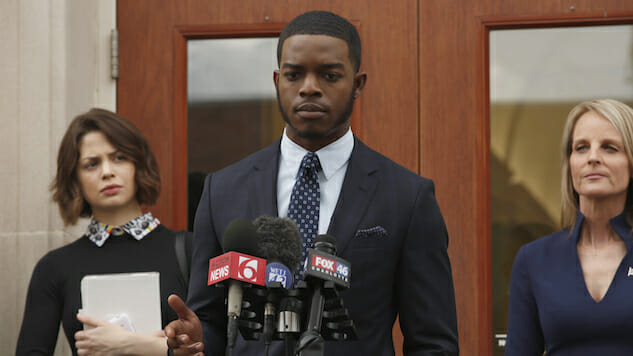Network TV Needs More Shows Like Fox’s Fraught, Affecting Shots Fired
Fox
TV that tries to be important and teach us something is tricky. It’s easy to fall into the trap of being didactic and patronizing (I love Freeform’s The Fosters, but it’s often guilty of this).
So I was more than a bit skeptical when I heard about Shots Fired. The series’ executive producers, Gina Prince-Bythewood and Reggie Rock Bythewood, sent an earnest letter to critics describing the effect George Zimmerman’s 2013 acquittal for the murder of Trayvon Martin had on their then 12-year-old son. Shots Fired, they hope, will give viewers varied perspectives—the police, the politicians, the parents, the lawyers, the witnesses, the community activists and the children—to help us all better understand each other. That’s a tall order for any series. But in the first three episodes available for review, they do a surprisingly effective job.
Shots Fired, which evokes the sprawling storytelling of ABC’s American Crime, begins in Gate Station, North Carolina, where Deputy Josh Beck (Mack Wilds) has shot and killed 19-year-old college freshman Jesse Carr (William Leinbach) during what appeared to be a routine traffic stop. But it’s not what you’re expecting: Josh is black and Jesse is white, in a town already fraught with racial unrest. At first, it seems that switching the races of those involved in the horrific real-life stories that have made national headlines is evidence of the producers backing away from their challenging subject matter, for which Orange is the New Black was criticized last summer. But be patient.
Detective Ashe Akino (Sanaa Lathan) and Special Prosecutor Preston Terry (Stephan James) are brought in to investigate the case at the request of Governor Eamons (Helen Hunt). That plot might be enough to tell a typical TV story, but Shots Fired, which arrives at an incredibly anxious and apt time, endeavors to tell a larger one: One of institutional racism and how our prejudices shape our daily interactions, how good cops can get lost in a bad department and vice versa, how difficult it is to grow up, how politicians can politicize just about anything and how a parent’s love for his or her children is a universal emotion.
Initially, Ashe and Preston make no progress when questioning those who witnessed Jesse’s shooting. “You keep asking the wrong question,” Cory (Marqus Clae) tells Preston. The right question leads Preston and Ashe to the unsolved murder of Joey Campbell, an African American teen shot to death. Joey’s death didn’t make headlines, nor did it cause a special prosecutor to come down and investigate. But soon the two murders intertwine, and Ashe and Preston know they must investigate both.
-

-

-

-

-

-

-

-

-

-

-

-

-

-

-

-

-

-

-

-

-

-

-

-

-

-

-

-

-

-

-

-

-

-

-

-

-

-

-

-








































